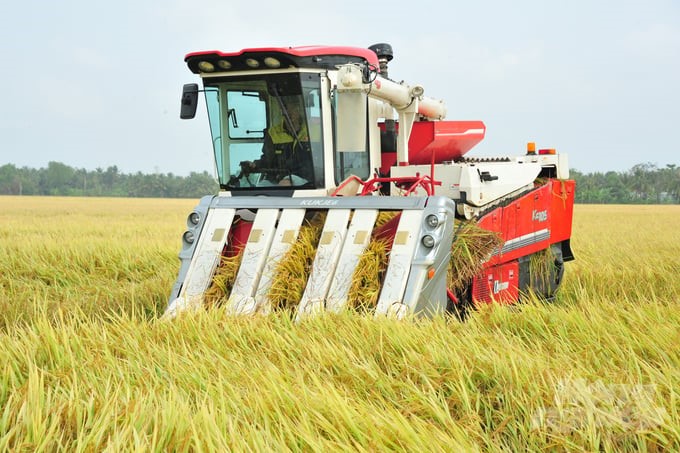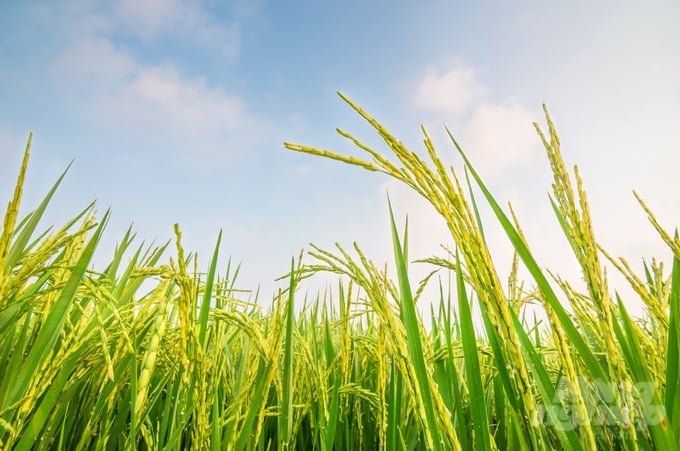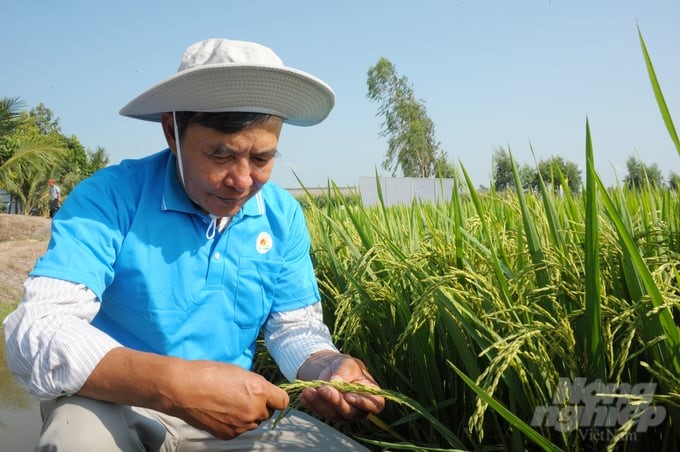November 19, 2025 | 23:08 GMT +7
November 19, 2025 | 23:08 GMT +7
Hotline: 0913.378.918
November 19, 2025 | 23:08 GMT +7
Hotline: 0913.378.918
An Giang Department of Agriculture and Rural Development, in collaboration with the Netherlands Development Organization (SNV) in Vietnam, recently organized a workshop "Transforming Rice Value Chains for Climate Resilient and Sustainable Development in the Mekong Delta" (referred to as the TRVC Project) for businesses and cooperatives in the rice value chain of An Giang province. Accordingly, the TRVC Project will support An Giang with about VND 22 billion to develop the local rice value chain.

The TRVC Project will create favorable conditions for An Giang to implement the Project of 1 Million Hectares of High-Quality Rice. Photo: Le Hoang Vu.
Mr. Ton That Thinh, Deputy Director of the An Giang Department of Agriculture and Rural Development, said that rice is one of the province's key industries. An Giang has a rice farming area of about 640,000 hectares/year, yielding about 4.1 million tons/year, of which high-quality rice varieties account for approximately 85%. To concretize the goal of sustainable development until 2030, An Giang province has registered with the Ministry of Agriculture and Rural Development to participate in the Project "Sustainable Development of 1 Million Hectares Specializing in High-Quality and Low-Emission Rice Cultivation Associated with Green Growth in the Mekong Delta," with the whole province's area specializing in high-quality rice cultivation reaching 40,000 hectares by 2025 and 150,000 hectares by 2030.
Currently, An Giang has an area participating in rice consumption linkages with businesses in the province of about 30,000–35,000 hectares/crop; however, in recent times, the impact of climate change and greenhouse gas emissions (irrigation water, weather, farming practices) has affected agricultural production.
Over the years, rice productivity has increased almost insignificantly (at the ceiling level). Therefore, to help farmers produce effectively, stably, and sustainably, An Giang's agriculture sector is paying attention to supporting investors to implement investment projects in the agricultural and rural fields in the province and promoting production and consumption linkage chains for agricultural products.

The TRVC Project will support An Giang with about VND 22 billion to develop the rice value chain. Photo: Le Hoang Vu.
This orientation as well as the opportunity of An Giang being one of three provinces (An Giang, Dong Thap, and Kien Giang) chosen by the Netherlands Development Organization (SNV) to implement the project will be a favorable condition to promote the transformation to rice farming methods with climate resilience and low carbon emissions through the development of sustainable value chains, while also improving the livelihoods of rice farming households.
"The TRVC project implemented in An Giang will open a new direction for rice production in the province, bringing great brand values, creating rice product lines produced in the way of environmental responsibility and reducing greenhouse gas emissions, and laying a solid foundation for businesses willing to participate. The implemented project will promptly support and create more favorable conditions for the province to participate in the Project 'Sustainable Development of 1 Million Hectares Specializing in High-Quality and Low-Emission Rice Cultivation Associated with Green Growth in the Mekong Delta until 2030'," expected Mr. Ton That Thinh, Deputy Director of the An Giang Department of Agriculture and Rural Development.

An Giang calls on businesses to participate in the TRVC Project. Photo: Le Hoang Vu.
Ms. Tran Thu Ha, SNV Project Director, said that the Project will support 10 businesses linking with cooperatives and farmers in the provinces of An Giang, Dong Thap, and Kien Giang to convert to low-emission rice production on an area of 200,000 hectares by 2027, with about 200,000 farmer households benefiting. This will contribute to realizing the ambition of reaching 1 million hectares of high-quality, low-emission rice in the Mekong Delta, according to the project of the Ministry of Agriculture and Rural Development.
In addition, the Project also has cash rewards worth VND 57 billion for farmers who participate and achieve greenhouse gas emission reduction goals by 2027, with emissions inspected by independent inspection agencies.
The Project "Transforming Rice Value Chains for Climate Resilient and Sustainable Development in the Mekong Delta" is sponsored by the Australian Embassy in Vietnam and the Netherlands Development Organization in coordination with the Ministry of Agriculture and Rural Development and the Department of Agriculture and Rural Development of An Giang, Dong Thap, and Kien Giang provinces in the 2023–2027 period. The Project will start to be implemented in the summer-autumn rice crop of 2024.
Translated by Thu Huyen

(VAN) The agricultural sector agreed on a roadmap to pilot the MRV protocol and expand low-emission rice production from the 2025-2026 winter-spring crop.

(VAN) Agricultural extension officers in Quang Ninh do more than transmit knowledge; they have become a steadfast support system for farmers on the path to sustainable agricultural development.

(VAN) The development of a high-quality beef cattle herd has brought major benefits to livestock farmers, creating jobs and enabling better use of agricultural by-products.

(VAN) In the eastern region of Gia Lai, crossbred cattle now account for 93%, forming a high-quality beef herd and establishing a recognized brand, the result of 35 years of persistent effort.

(VAN) Integrating agricultural extension activities with ecotourism development unlocks promising new avenues for localities boasting specific advantages in grape and apple cultivation.

(VAN) Enterprises and cooperatives accompany farmers in Tay Ninh to develop an organic seedless lime growing area, paving the way for poverty reduction.

(VAN) There were times when Pho faltered, yet his aspiration to bring the pure aroma to those who truly value clean tea kept urging him forward.